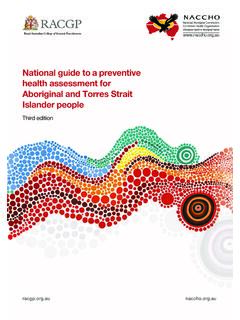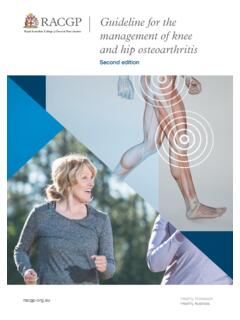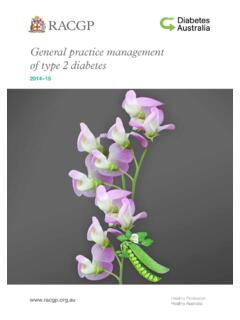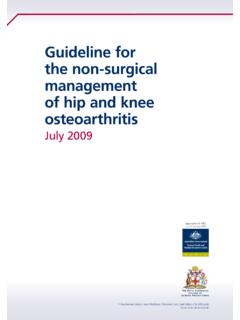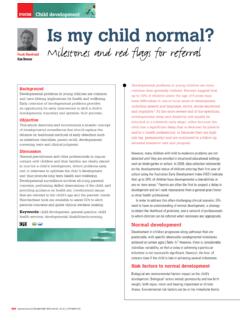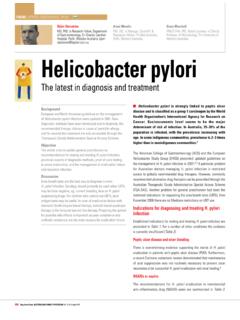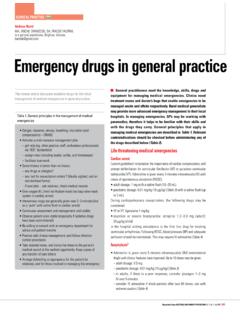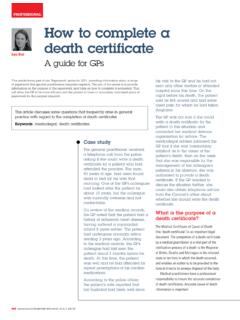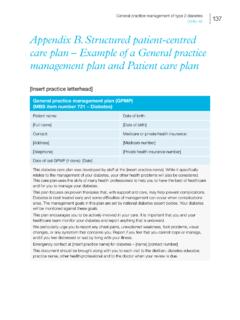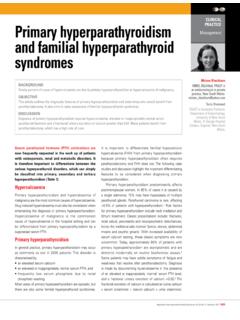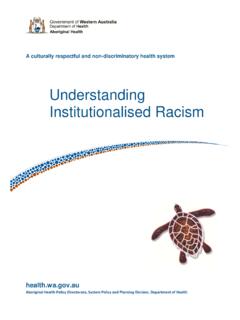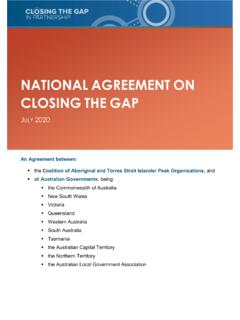Transcription of Cultural awareness education and cultural safety training
1 Healthy awareness education and Cultural safety trainingIllustration: Gilimbaa Creative AgencyRACGP aboriginal and Torres Strait Islander Health Cultural awareness education and Cultural safety training 1 PreambleThe Royal Australian College of General Practitioners (RACGP) is committed to improving the health of aboriginal and Torres Strait Islander people, most significantly demonstrated by the establishment of the RACGP aboriginal and Torres Strait Islander Health in February its position statement on aboriginal and Torres Strait Islander health,1 the RACGP recognised that the medical profession had a key role to play in improving the quality of health services to aboriginal and Torres Strait Islander people. It made a commitment to raising general practitioner awareness of aboriginal and Torres Strait Islander health needs and their Cultural context, and to advocating for culturally appropriate health delivery systems that improve health outcomes. In April 2010, the Department of Health (DoH) announced the requirements for the Practice Incentives Program Indigenous Health Incentive.
2 One of the Indigenous Health Incentive requirements is that at least two practice members (one of whom must be a GP) must undertake approved Cultural awareness training within 12 months of committing to the incentive. In June 2010, DoH provided funding to RACGP aboriginal and Torres Strait Islander Health to undertake the project, Implementing a RACGP response to the Cultural awareness training Requirements of the Indigenous Practice Incentive . This project had two components: An online activity: Introduction to aboriginal and Torres Strait Islander Cultural awareness in general practice, which is available free of charge to practices participating in the Indigenous Health Incentive and to RACGP QI&CPD Program participants Development of educational criteria to adjudicate applications by training providers to deliver Cultural awareness education and Cultural safety training to project allows the RACGP to support general practices to participate in the various measures of the Indigenous Health Incentive intended to provide better healthcare for their aboriginal and Torres Strait Islander patients.
3 It also makes more tangible the RACGP s commitment to encourage GPs and their practice staff to develop an understanding of aboriginal and Torres Strait Islander culture, history and health, and to incorporate this into their own professional awareness education and Cultural safety training The RACGP recognises that Cultural education and training programs are described in various ways, including Cultural competence or Cultural security training . The RACGP has chosen to focus on two descriptive terms: Cultural awareness education and Cultural safety training , and draws a distinction between the two. Cultural awareness education is defined as: An understanding of how a person s culture may inform their values, behaviours, beliefs and basic assumptions .. [It] recognises that we are all shaped by our Cultural background, which influences how we interpret the world around us, perceive ourselves and relate to other people .2 The focus of Cultural awareness education is on outcomes for the participant or learner: self reflection leading to enhanced Cultural awareness .
4 It is introductory in nature, and through increased awareness , the learner can enhance their skills in working effectively with aboriginal and Torres Strait Islander people. Cultural awareness education is considered to be the first building block toward Cultural it is generally recognised that Cultural awareness education results in enhanced awareness , but not necessarily in behavioural change, this method of education aligns with the style of teaching that obtains RACGP Category 2 QI&CPD safety training , too, requires an awareness of how the practitioner s own values can influence their practice, but it has a focus on outcomes for health services and their patients. RACGP aboriginal and Torres Strait Islander Health Cultural awareness education and Cultural safety training2 Cultural safety is defined as an outcome of health practice and education that enables safe service to be defined by those who receive the service .3 Strategies aim to create an environment that is safe for people: where there is no assault, challenge or denial of their identity, of who they are and what they need , where there is shared respect, shared meaning, shared knowledge and experience, of learning, living and working together with dignity and truly listening.
5 4 Cultural safety training is more indepth and aims to result in a behavioural change. The approach to training is still highly reflective but it also uses learning methodologies that result in behavioural changes and practice improvements. To this end, Cultural safety training is an RACGP Category 1 QI&CPD activity, based on the participant s own RACGP strongly encourages GPs and practice staff to participate in both Cultural awareness education and Cultural safety training . It facilitates this in two ways: by developing the Cultural awareness education activity that is provided via the RACGP s gplearning and ClinEd websites and by developing educational criteria to ensure the quality of Cultural awareness education and Cultural safety training programs provided by training providers to activity: Introduction to aboriginal and Torres Strait Islander Cultural awareness in general practiceThe RACGP s Introduction to aboriginal and Torres Strait Islander Cultural awareness in general practice activity is an online Cultural awareness education activity.
6 It aims to improve the health of aboriginal and Torres Strait Islander people by enhancing the Cultural awareness of GPs, general practice staff, primary healthcare staff and other healthcare providers. This activity is a compulsory requirement for all GP trainees in the RACGP Specialist Pathway, including overseas trained doctors. Medical students will also of this activity allows participants to meet the Cultural awareness training requirements for the Practice Incentives Program Indigenous Health Incentive. It has been approved for 40 Category 1 points in the RACGP QI&CPD Program 2017 2019 6 hour activity aims to help participants to: extend their knowledge about aboriginal and Torres Strait Islander history and culture explore how attitudes and values can influence perceptions, assumptions and behaviours in a clinical setting discuss key issues facing the practice team and aboriginal and Torres Strait Islander people consider ways to address these of educational criteria for Cultural awareness education and Cultural safety trainingThe RACGP QI&CPD Program aims to assist Australian GPs to maintain and improve the quality of care they provide to patients and promote care to the community of the highest possible standard.
7 Assessment of all educational activities by these standards is extremely rigorous. The development of the QI&CPD Program is based on a number of well accepted adult learning principles, which emphasise that learning outcomes are improved when the learning: is self directed is driven by the learner s identified needs is integrated into an individual s learning program encourages active participation involves reflection and evaluation of what was learnt. RACGP aboriginal and Torres Strait Islander Health Cultural awareness education and Cultural safety training 3 The QI&CPD criteria used to assess educational activities are extremely rigorous. However, these requirements only cover educational standards for general practice and do not cover important dimensions relating to Cultural awareness education and Cultural safety training . RACGP aboriginal and Torres Strait Islander Health believes that any Cultural awareness education or Cultural safety training should be based on genuine partnership with aboriginal and Torres Strait Islander people and involvement with local communities in its planning, delivery and evaluation.
8 Therefore, an additional set of standards to the QI&CPD criteria is necessary to ensure that Cultural awareness education and Cultural safety training for GPs is of a high standard. This means that any application by an training provider for assessment of Cultural awareness education and Cultural safety training will be assessed by two sets of educational standards: QI&CPD educational standards,5 followed by educational criteria for Cultural awareness education and Cultural safety of the criteria for Cultural awareness education and Cultural safety training and contact details for state and territory QI&CPD offices are detailed in Appendices 1, 2 and this means for GPs, practice staff and training providersAs a result of the development of the online activity and the Cultural educational criteria, GPs and practice staff can consider the following options: Cultural awareness education : They can participate in the online RACGP activity or in other externally delivered Cultural awareness education approved by the RACGP.
9 They can also apply for QI&CPD accreditation through an individual active learning module (ALM) application. These options will be assessed according to the QI&CPD criteria and the Cultural awareness education criteria. For the purposes of registration for the Indigenous Health Incentive, they can also participate in other Cultural awareness education approved by the National aboriginal controlled community Health Organisation (NACCHO), affiliates or other professional medical colleges ( ACCRM, RACP) Cultural safety training : They can participate in the training delivered by training providers that is accredited by the RACGP via existing QI&CPD criteria and the Cultural safety training criteria. They can also participate in other Cultural safety training approved by NACCHO, affiliates or other professional medical colleges for registration with the Indigenous Health following options will be available for training providers ( NACCHO, affiliates, divisions of general practice) wishing to obtain RACGP QI&CPD accreditation: Apply for accreditation of their Cultural awareness education (which could be delivered online or face-to-face) under the RACGP QI&CPD criteria and the Cultural awareness education criteria Apply for accreditation of their Cultural safety training (which must be delivered face-to-face), under the RACGP QI&CPD criteria and the Cultural safety training criteria.
10 1 Available at Centre for Cultural Diversity in Ageing. Available at Eckermann AK, et al. Binan Goonj: Bridging Cultures in aboriginal Health. 2nd edn. Churchill Livingstone, Williams R. Cultural safety What does it mean for our work practice? Australian and New Zealand Journal of Public Health 1999;23:213 Available at aboriginal and Torres Strait Islander Health Cultural awareness education and Cultural safety training4 Appendix 1: Educational criteria for Cultural awareness education (Category 2 QI&CPD)Step 1: The training must satisfy the RACGP QI&CPD education criteria All Cultural awareness education must first satisfy the QI&CPD education criteria for the 2017 2019 training program for Category 2 activities. All training must be submitted first to the RACGP state faculty QI&CPD office for adjudication (see Appendix for details). Once adjudication has taken place, the application will be forwarded to RACGP aboriginal and Torres Strait Islander Health for Step 2 of the adjudication process.
